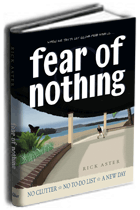There was a major winter storm here this week. My clutter-busting on Tuesday consisted of removing unwanted snow mixed with sleet from my car and the pavement in front of it so that I would be able to drive again when the roads improved on Wednesday. By the time the snow ended, it was dark, and I never got around to shoveling the snow away from the back door. The snow froze solid Tuesday night. Ever since, I have not been able to open the back door.
If I can’t open the back door for a few days, that is a minor inconvenience, little more than a curiosity. I couldn’t take out the trash this week, but there is always next week. I am not the only one facing the obstacle of frozen snow either. I have heard from people whose front doors are frozen shut. Rather than attempt the slippery walk around the house from the back door to the ice-encased car, they have postponed all errands and resolved to stay home for a few days. On the streets, I’ve seen and envied people who looked at their cars, the tires trapped in snowy ice, and decided in a similar way that they did not need to drive anywhere until the weather improved.
If you’re stuck indoors and clutter-busting, it’s not a bad time to go through papers. In keeping with the Fear of Nothing maxim of getting rid of the worst stuff first, I would start with the oldest shoe box of bills and records you have. On the other hand, if you want to start with the incoming mail or with tax filings that are due this year, that is legitimate too. Once that’s done, you can return to the old papers. Bills and other records of ordinary expenses lose all relevance in less than five years.
That doesn’t mean you can just put that whole shoe box from 1998 in the paper recycling, though. Are there statements of financial accounts that remain open, such as a checking account, credit card, or home mortgage? The pages with those account numbers are safer shredded or burned. Duplicate forms, carbon paper, and polyethylene envelopes can’t be recycled with paper. It’s possible that there are transaction records you will want to keep, such as the record of the purchase of an asset you still own and might sell someday. With those few exceptions, though, you may be able to put nearly all of your older bills and statements in the paper recycling.
I have taken on the practice of scanning new documents so I don’t have to keep papers. In the Internet era, it’s possible to get most documents in electronic form to begin with, saving the effort of scanning. The cost of keeping electronic documents is orders of magnitude lower than keeping papers, but that doesn’t mean keeping them forever. At least once a decade, it’s worth taking a few hours to delete the archived electronic documents that no longer mean anything. As with papers, a cold winter’s day when you don’t want to go out is a good time for this kind of work.




No comments:
Post a Comment